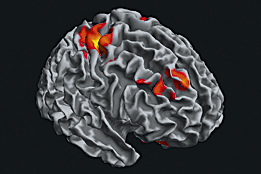- Home
- Research
- Neuroscience Research Centre
- Other laboratories
- Laboratory for Research in Neuroimaging - LREN
Laboratory for Research in Neuroimaging - LREN

At the Laboratory for Research in Neuroimaging (LREN), directed by Prof. Bogdan Draganski, clinical and basic neuroscientists study human brain structure and function relevant to neurological disorders and normal cognition.
LRENs team aims to achieve a better understanding of a wide range of brain diseases, including neurodegenerative disorders (in particular Alzheimer's disease), movement disorders (such as Parkinson's) and cerebrovascular disorders.
The LREN has set itself four concrete goals:
- To identify regionally specific, distributed, morphological brain anomalies to permit specific and sensitive detection of the signs of cerebral aging and the earliest stages of neurodegenerative illnesses, particularly in the case of Alzheimer's. The aim of this early and reliable detection is to be able to treat the illness before the first symptoms appear. Furthermore, as all treatments necessarily entail side effects, it will mean that only the patients who truly require treatment receive it.
- To design a treatment that will allow us to evaluate the brain's potential to recover from a transient ischemic attack, a stroke or cranial trauma. The goal is to be able to predict whether a patient's brain will recover given the degree of trauma and the patterns of areas affected.To understand the brain's connectivity, that is to say the system of connections between its different parts and the role they play for various brain functions. The aim is to better localise areas of the brain that can be electrically modulated to combat illnesses such as depression, obsessive-compulsive disorder (OCD) etc.
- To understand how the structure of the brain reorganises following an injury or dysfunction; how certain neural networks are replaced by others when lost. The goal is to determine areas that if activated or deactivated will facilitate cerebral plasticity and reinforce its ability to adapt to injury.
By making progress in these four areas we can begin to envisage the eventual implementation of concepts that will allow us to tailor treatments to patient profiles.
- LREN’s research infrastructure includes a cutting-edge 3T Prisma MRI scanner thanks to the LREN is responsible for a state-of-the-art neuroimaging platform featuring high-end research-only Siemens Prisma 3T MRI scanner and sophisticated MRI compatible neurophysiological equipment.
- LRENs main goal is to translate research findings into clinical applications for prevention, early diagnosis of disease and for prediction of clinical outcome. We provide the neuroimaging expertise and infrastructure for large-scale initiatives supported by the Swiss National Science Foundation and the Swiss Academy of Medical Sciences – the longitudinal CoLaus|PsyCoLaus and the SPHN SACR cohorts. LRENs research is supported by competitive national (SNSF, SAMS, InnoSuisse, Bertarelli) and EU grants additionally to generous funding from the charitable Roger De Spoelberch and Partridge foundations.
The expertise of a team of specialists
LREN’s research infrastructure includes a cutting-edge 3T Prisma MRI scanner thanks to hte generous support by th eFoundation Roger de Spoelberch and the Partridge Foundation with MRI compatible equipment for auditory, visual and somatosensory stimulation next to high-density EEG system with neuronavigation.
The team brings together the skills of top specialists in the field of biomedical image analysis.



